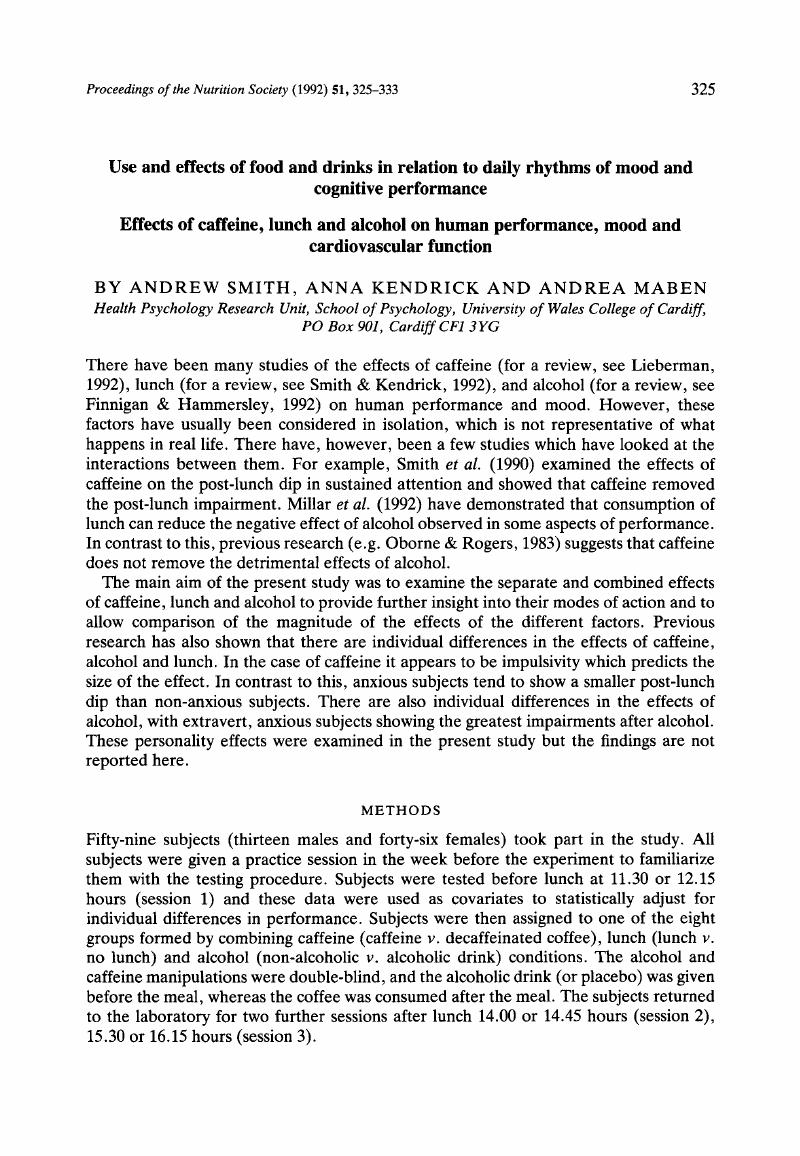Crossref Citations
This article has been cited by the following publications. This list is generated based on data provided by Crossref.
Poikolainen, Kari
1994.
The other health benefits of moderate alcohol intake.
Contemporary Drug Problems,
Vol. 21,
Issue. 1,
p.
91.
Koelega, H. S.
1995.
Alcohol and vigilance performance: a review.
Psychopharmacology,
Vol. 118,
Issue. 3,
p.
233.
Hope, A. T.
Woolman, P. S.
Gray, W. M.
Asbury, A. J.
and
Millar, K.
1998.
A system for psychomotor evaluation; design, implementation and practice effects in volunteers.
Anaesthesia,
Vol. 53,
Issue. 6,
p.
545.
Hogervorst, E.
Riedel, W. J.
Schmitt, J. A. J.
and
Jolles, J.
1998.
Caffeine improves memory performance during distraction in middle-aged, but not in young or old subjects.
Human Psychopharmacology: Clinical and Experimental,
Vol. 13,
Issue. 4,
p.
277.
Bellisle, F.
Blundell, J. E.
Dye, L.
Fantino, M.
Fern, E.
Fletcher, R. J.
Lambed, J.
Roberfroid, M.
Specter, S.
Westenhöfer, J.
and
Westerterp-Plantenga, M. S.
1998.
Functional food science and behaviour and psychological functions.
British Journal of Nutrition,
Vol. 80,
Issue. S1,
p.
S173.
FINNIGAN, F.
HAMMERSLEY, R.
and
MILLAR, K.
1998.
Effects of Meal Composition on Blood Alcohol Level, Psychomotor Performance and Subjective State after Ingestion of Alcohol.
Appetite,
Vol. 31,
Issue. 3,
p.
361.
Van der Stelt, Odin
1999.
Caffeine and Behavior.
Dougherty, Donald M.
Marsh, Dawn M.
Moeller, F. Gerard
Chokshi, Reena V.
and
Rosen, Valerie C.
2000.
Effects of Moderate and High Doses of Alcohol on Attention, Impulsivity, Discriminability, and Response Bias in Immediate and Delayed Memory Task Performance.
Alcoholism: Clinical and Experimental Research,
Vol. 24,
Issue. 11,
p.
1702.
Marsden, Graham
and
Leach, John
2000.
Effects of alcohol and caffeine on maritime navigational skills.
Ergonomics,
Vol. 43,
Issue. 1,
p.
17.
Peele, Stanton
and
Brodsky, Archie
2000.
Exploring psychological benefits associated with moderate alcohol use: a necessary corrective to assessments of drinking outcomes?.
Drug and Alcohol Dependence,
Vol. 60,
Issue. 3,
p.
221.
Dougherty, Donald M.
Marsh, Dawn M.
Moeller, F. Gerard
Chokshi, Reena V.
and
Rosen, Valerie C.
2000.
Effects of Moderate and High Doses of Alcohol on Attention, Impulsivity, Discriminability, and Response Bias in Immediate and Delayed Memory Task Performance.
Alcoholism: Clinical and Experimental Research,
Vol. 24,
Issue. 11,
p.
1702.
Ilan, Aaron B.
and
Gevins, Alan
2001.
Prolonged neurophysiological effects of cumulative wine drinking.
Alcohol,
Vol. 25,
Issue. 3,
p.
137.
Marsh, Dawn M
Dougherty, Donald M
Mathias, Charles W
Moeller, F.Gerard
and
Hicks, Lisa R
2002.
Comparisons of women with high and low trait impulsivity using behavioral models of response-disinhibition and reward-choice.
Personality and Individual Differences,
Vol. 33,
Issue. 8,
p.
1291.
Mathias, Charles W.
Dougherty, Donald M.
Marsh, Dawn M.
Moeller, F. Gerard
Hicks, Lisa R.
Dasher, Kevin
and
Bar-Eli, Lee
2002.
Laboratory Measures of Impulsivity: A Comparison of Women with or Without Childhood Aggression.
The Psychological Record,
Vol. 52,
Issue. 3,
p.
289.
Dougherty, Donald M.
Marsh, Dawn M.
and
Mathias, Charles W.
2002.
Immediate and delayed memory tasks: A computerized behavioral measure of memory, attention, and impulsivity.
Behavior Research Methods, Instruments, & Computers,
Vol. 34,
Issue. 3,
p.
391.
Dougherty, Donald M.
Bjork, James M.
Moeller, F. GERARD
Harper, R. ANDREW
Marsh, Dawn M.
Mathias, Charles W.
and
Swann, Alan C.
2003.
Familial Transmission of Continuous Performance Test Behavior: Attentional and Impulsive Response Characteristics.
The Journal of General Psychology,
Vol. 130,
Issue. 1,
p.
5.
Dougherty, Donald M.
Bjork, James M.
Harper, R. Andrew
Mathias, Charles W.
Moeller, F. Gerard
and
Marsh, Dawn M.
2003.
Validation of the Immediate and Delayed Memory Tasks in Hospitalized Adolescents with Disruptive Behavior Disorders.
The Psychological Record,
Vol. 53,
Issue. 4,
p.
509.
Dougherty, Donald M.
Bjork, James M.
Andrew Harper, R.
Marsh, Dawn M.
Gerard Moeller, F.
Mathias, Charles W.
and
Swann, Alan C.
2003.
Behavioral impulsivity paradigms: a comparison in hospitalized adolescents with disruptive behavior disorders.
Journal of Child Psychology and Psychiatry,
Vol. 44,
Issue. 8,
p.
1145.
Lorist, Monicque
Snel, Jan
and
Tieges, Zoë
2004.
Coffee, Tea, Chocolate, and the Brain.
Vol. 20043667,
Issue. ,
Dougherty, Donald M.
Mathias, Charles W.
Marsh, Dawn M.
Papageorgiou, T. Dorina
Swann, Alan C.
and
Moeller, F. Gerard
2004.
Laboratory Measured Behavioral Impulsivity Relates to Suicide Attempt History.
Suicide and Life-Threatening Behavior,
Vol. 34,
Issue. 4,
p.
374.



